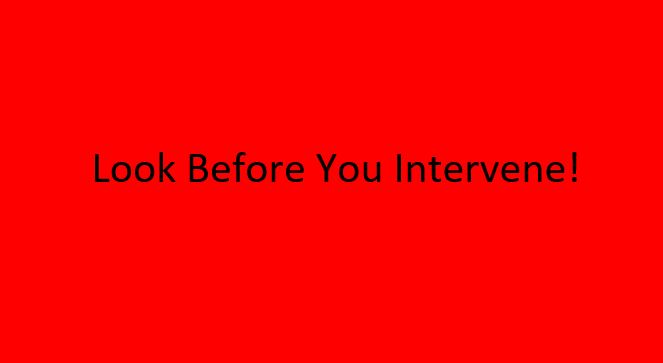If you look up ‘Iatrogenics’ on Google, you will find numerous definitions of the word relating to the harmful effects of medical intervention. Iatrogenics was first used to describe the consequences that were inadvertently induced by a healer in an attempt to solve a physical issue with the body.
I came across this term in Nasim Taleb’s book ‘Antifragile’ in which he talks about this concept in various other areas of life. In a way, it reminded me of the article I had posted some time ago on the ‘Helping Others’. It also reminded me of one of my favorite quotes:
‘The road to hell is paved with good intentions’
variation from a quote from Saint Bernard of Clairvaux
The Domains of Iatrogenics
Iatrogenics raises its ugly head in more areas than just medicine. In fact, you can think of any domain that you operate in, and you will be able to check how it plays a role.
Medicine – The harmful effects of medication that could have been avoided if the body was allowed to heal itself. Reduction in the immune system that is often caused due to high doses of antibiotics. The dependency that supplements create in the system, making it unable to process food and toxins the way nature intended.
Parenting – The highly unintended creation of a rebellious monster due to strict parenting techniques. The creation of a child who has no boundaries or discipline due to limitless ‘so-called’ love. The numerous beliefs or ‘shoulds’ that we implant in the children’s mind that later lead to limiting beliefs or hurdles.
Relationships – The effort that we put into a relationship ending up with the partner feeling suffocated. The freedom that we do not allow our partners that leads to indifference and cheating.
Feminism – The resentment among men leading to higher levels of exclusion based on gender (though secretly and under wraps) due to gender reservations and forced quotas in corporate boardrooms.
Mental Health – The popularity and common use of mental health terms and a belief among numerous people that they have depression, panic attacks, suicidal thoughts, and more because of mental health awareness campaigns.
Racism – The heightened (and again secretly head beliefs) anger against specific races due to the importance (at least in the media) given to certain lives (and not ALL lives).
Nature, war, and modern development are other areas where iatrogenics is more than evident!
Is all Intervention Bad?
The idea of this article is not to completely discourage you from any kind of intervention, because that could also lead to inaction (and as my regular readers know, I am fairly against inaction).
The main aim behind this post is to give you a nudge and make you think about how some of the most well-meaning actions can lead to unexpected consequences. Keeping this in mind helps in holding ourselves back from intervening too quickly or too hastily.
How does Knowledge of Iatrogenics help us?
When we are aware of the concept of iatrogenics, we can then begin to evaluate any kind of intervention that we might want to indulge in with consciousness. We are more likely to take a pause, think about the possible outcomes, and allow for nature to take its course in most situations unless intervention is absolutely necessary.
It allows us to ponder on the possible unintended outcomes of intervention. When we do that, we are able to think through the situation from various angles; perspectives that may have been lost to us based on our pre-set beliefs and values. For example, if you are completely convinced that strict discipline will make your child hard working and diligent, you will be forced to think of any possible negative outcomes of the approach; something you may not have done if you were not aware and careful about iatrogenics.
Iatrogenics also helps us think about our own hidden motives and agendas that we may not be so ready to accept. In the above example, a mother is unlikely to be forthcoming (even with herself) that her desire to see a child perform great in academics is mainly due to her own need to feel fulfilled or a need for validation that she may be seeking from others.
To Summarize
Helping others is a great thing! However, it is important to intervene only after you have yourself raised yourself to that level where you feel that you are not imposing your own limiting thoughts and beliefs on the other person by giving advice! Support and motivation are the best sources of any kind of intervention that you can offer anyone. In addition to that, this support has to come from a place of non-judgment and compassion.


Excellent, Shiwani! That quote at the beginning of your article is very apt. It is usually under the garb of good intentions a lot of unintended harm is done and parents are sometimes the worst offenders.
Sometimes its a garb and most often its ignorance and the belief that we can control better (than nature)!
Interesting thought. “The freedom that we allow our partners that leads to indifference and cheating.” Really? Yes, I suppose it does lead to that.
It would be even more interesting if more was written on it.
Thank you for your comment. The statement that you mention should have been – the freedom that we do NOT allow our partners…..changing it now!
Yes, that too.